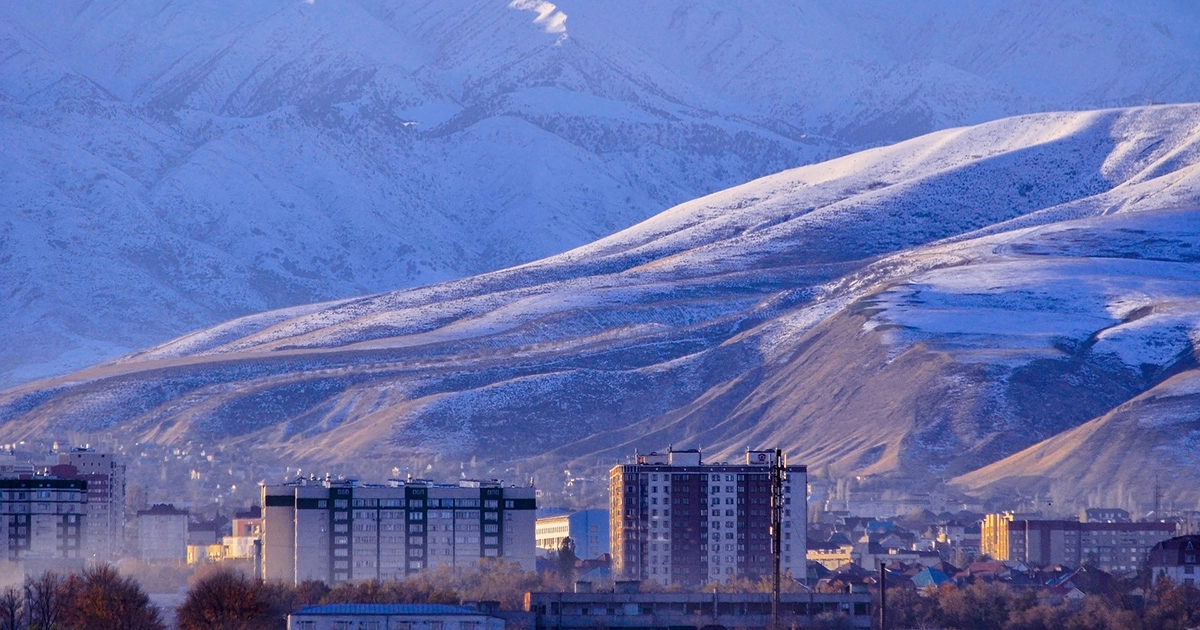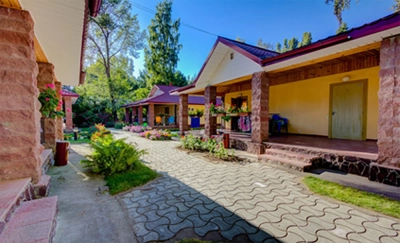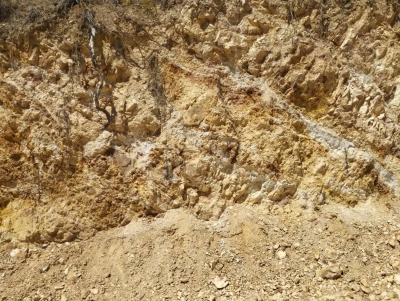Kyrgyzstan
 Table of contents
Table of contents
Kyrgyzstan is a state located in Central Asia. Until now, it remains a little-known country for most foreigners. However, this mountainous country has an ancient history, picturesque Tien Shan mountains, Issyk-Kul lake, mineral and thermal springs, medieval caravanserais, and even ski resorts. Kyrgyzstan is a presidential, secular, unitary republic.
General information
Population — 6,256,700 people, of which Kyrgyz — 52%, Russians — 22%, Uzbeks — 13%. Ukrainians and Tatars also live in the state. In total, there are about 70 nationalities on the territory of the state. In Kyrgyzstan, two official languages are Kyrgyz and Russian. Among believers, the majority are Sunni Muslims and Christians. The monetary unit is the som. The capital is Bishkek (966 thousand inhabitants). Other large cities are Osh, Jalal-Abad, Tokmok.
In terms of area, the country ranks 85th in the world, 7th among the CIS countries. Kyrgyzstan is a member of the UN, the CIS, the Eurasian Economic Union, the Collective Security Treaty Organization, the Shanghai Cooperation Organization, the Organization of Islamic Cooperation, and the Organization of Turkic States.
History, geography, culture, mentality
The most ancient traces of people living on the territory of Kyrgyzstan date back to the Paleolithic. The main occupation of the population was considered to be the manufacture of pottery, gathering and hunting, which can be judged by the presence of bows and arrows in the zone. Since the 12th century, the mass enslavement of the population by the troops of the Golden Horde begins. The Kyrgyz people lost their independence several times, but always gained it again.
At the beginning of the 13th century, the Kyrgyz fell under the rule of the Mongols, but at the end of the 14th century they were liberated. Kyrgyzstan is located between 4 countries: Kazakhstan, China, Tajikistan and Uzbekistan. The people of these countries also led a nomadic lifestyle, so until 1700 the inhabitants of Kyrgyzstan fell under the rule of their tribes. In the 1750s, tribal relations began to form among the local tribes, which lasted until the 20th century, despite the fact that at the beginning of the 19th century the people again fell under the rule of a stronger khanate. In such a system of government, the people had their own leader — the manap. The desire of the Kyrgyz to free themselves from the Kokand Khanate led to mass uprisings that flared up for a decade in 1850. At the same time, the active annexation of the Kyrgyz lands to Russia began.
In 1924, Kyrgyzstan was given the status of a state that is part of the Union of Republics — the Kirghiz SSR. By the 1930s, the active development of industry began: coal was mined, non-ferrous metallurgy developed. In 1991, on August 31, after the collapse of the USSR, Kyrgyzstan proclaimed itself an independent Kyrgyz Republic. At the end of the 20th century, certain economic difficulties began in the country. Restoration of the state economy is going on to this day.
Kyrgyzstan is located in Central Asia. It borders Kazakhstan in the north, China in the east, Uzbekistan in the west, and Tajikistan in the southwest. There is no access to the sea. The total area of this country is 198,500 square kilometers, and the length of the state border is 3,878 km. More than 80% of the territory of Kyrgyzstan is located in the Tien Shan mountain system. In the southwest of the country there is the Pamir-Alay mountain system, and in the north and southwest there are the fertile Fergana and Chui valleys. The highest point is Pobeda Peak, whose height reaches 7,439 meters. In the northeast, in the Tien Shan mountains, is Lake Issyk-Kul, the second largest mountain lake in the world.
The cultural life of the Kyrgyz was formed not only under the influence of nomadic life, but also under the influence of those khanates and states that subjugated the territory and people. Due to the fact that the Kyrgyz are a nomadic people, everything was made in order to be closer to nature. The clothes were made of natural material, but always met the beauty standards of the people. Several types of outfit were also made to prepare in advance for climate change. The main animal in the local culture is the horse. It serves not only as a means of transportation, but plays an important role in the marriage ceremony.
Despite the entry of Kyrgyzstan into a high-tech society, old traditions remain and are preserved. The people are very hospitable and disposed to people, and also appreciate the nature of the world and try to take care of it. In order to really get to know the local culture, tourists should visit the jailoo in summer (this is how the high-mountain pasture is called in Kyrgyzstan, it is located at an altitude of 2500-3000 meters above sea level).
The Kyrgyz are a friendly and united people. They sincerely love their land and support the centuries-old traditions founded by their ancestors. So, for example, in modern Kyrgyz society there are still ashars — communities of people whose goal is mutual assistance. To cope with some big business, the Kyrgyz ask for the support of friends, neighbors, relatives, and they all get down to work together, thus getting a quick and high-quality result. This tradition has come from the times when people could survive only thanks to mutual assistance, solidarity and friendship. In professional activities, the Kyrgyz are diligent, as well as in economic affairs. They know how to work consistently and efficiently. Endowed with ingenuity, resourceful and in many ways inventive.
A distinctive psychological feature of this people is the ability to control any situation. Many Kyrgyz are strong-willed individuals with a strong spirit. Often their appearance emphasizes inner strength. The nomadic way of life led to the emergence of friendliness among the ancestors towards foreigners. They especially respect and honor the fraternal peoples inhabiting Central Asia.
Power
According to the current Constitution of 2010, Kyrgyzstan is a parliamentary republic. Its head is the President, elected for 6 years. The unicameral parliament consists of 120 deputies elected for 5 years. The main political parties in the state are Ata-Jurt, SDPK, Ar-Namys, Respublika and Ata-Meken.
Zhogorku Kenesh is the parliament of the Kyrgyz Republic. It is the highest representative body exercising legislative power and control functions within its powers. The judicial system of the Kyrgyz Republic is established by the Constitution and laws, and consists of the Supreme Court and local courts.
Economy
Kyrgyzstan belongs to the category of agro-industrial countries. The main income of Kyrgyzstan is farming and agriculture. Strengths of the national economy: hydropower and tourism potential, cheap skilled labor, mineral deposits. The country, 75% of whose territory is mountainous, specializes in the extraction of gold, coal, and mercury. 17 hydroelectric power stations provide electricity to the entire republic and neighboring states. 85% of agricultural enterprises are engaged in animal husbandry. Tourism is actively developing. Mountain and beach tourism are developing sectors of the national economy, which form 5% of GDP.
In the early years of independence, Kyrgyzstan faced an economic crisis. This happened mainly as a result of the collapse of the USSR and the destruction of economic ties with the countries of Eastern Europe, which later hindered the transition to a market economy. The export of Kyrgyzstan is 2 times less than the import. The main problems of the country's economy are the outdated material base of industrial enterprises, an impressive external debt.
The annual GDP growth of Kyrgyzstan is 5-15%. Its dynamics mainly depends on the volume of mining. The country has cheap raw materials and labor, a secure political environment.
A large percentage of GDP is formed by companies providing financial and educational services. There are 25 banks and 52 universities in the country. The low cost of education attracts Kyrgyz universities from other CIS countries, India, Turkey and China.
There are no restrictions on the import of foreign and local currency (and export) in Kyrgyzstan. All money must be included in the declaration. You can not import literature that is contrary to the norms of Islam. You can not export rare birds, animals, precious stones and gold.
Business climate
As a democratic country, the Kyrgyz Republic adheres to a mixed economic system, the main principles of which are free enterprise, a free pricing system, free competition, and state regulation. Development in the industrial sector is provided mainly by the power industry, non-ferrous metallurgy and the food industry. Achievements in agriculture are provided mainly by peasant farms. In recent years, processing enterprises have been actively developing to supply products to Kazakhstan and Russia. But their capacity is small, which prevents the acquisition of expensive and modern equipment for the modernization of this industry.
The main problem hindering the country's economic development was political instability. Previously, entrepreneurs most often pointed out corruption as an obstacle. These are the results of a survey conducted by the Chamber of Commerce and Industry (CCI).
Investment climate
The Kyrgyz Republic remains a frontier market, with a fairly high level of risk. However, the government has expressed a desire to attract larger and more diversified foreign direct investment (FDI) and develop a green economy to promote sustainable economic growth. Although official attitudes towards FDI are positive and there are no legal restrictions on foreign ownership or control, in practice foreign investors may be subject to more scrutiny than domestic investors. The country's ability to provide an enabling environment for investment still faces many challenges.
The mining industry has historically been the industry that attracted the most FDI to the Kyrgyz Republic. However, other growing industries, including textiles, agriculture, education, franchising and information technology, are attracting interest from both domestic and foreign investors.
Green investment is another promising area for potential investors as the Kyrgyz government has stepped up its commitment to combating climate change and sustainable development. In 2021, the Kyrgyz Republic joined the Global Methane Commitment and unveiled revised Nationally Determined Contributions, which also opened up many opportunities for foreign firms seeking to invest in industries such as hydropower, energy efficiency and methane abatement.
Business and investment support structures
Starting a business in the Kyrgyz Republic has become easier with the abolition of the minimum capital requirement for business registration, the abolition of certain registration fees, and the reduction of registration periods. Registration of legal entities, branches or representative offices in the Kyrgyz Republic is carried out on the basis of “notifying registration” and “one stop shop” practice. State registration of a legal entity is carried out within three working days from the date of submission of the necessary documents for a fee.
To stimulate the inflow of direct investments, in December 2020, the Parliament adopted the law “On Amendments to Certain Legislative Acts of the Kyrgyz Republic on Investment Support”. This law provides the following rules regarding investment issues. The concept of "investment lots" is introduced, which provides investors with a package of services to help the investor start their project. Local authorities have the right to carry out the transfer of land.
The Kyrgyz Development and Investment Agency has the right to apply to the Ministry of Foreign Affairs for an investor visa for individuals who have invested more than 10 million soms. In addition, changes in the legislation on public-private partnership (PPP) are aimed at simplifying the procedure and attracting more investment.

Tags:

28,981,156 ₽
648,262,700 ₽

1,543,888,000 ₽

1,775,471,200 ₽


 New artıcles
New artıcles

 REAB Services
REAB Services
 News
News
 Useful tip
Useful tip

